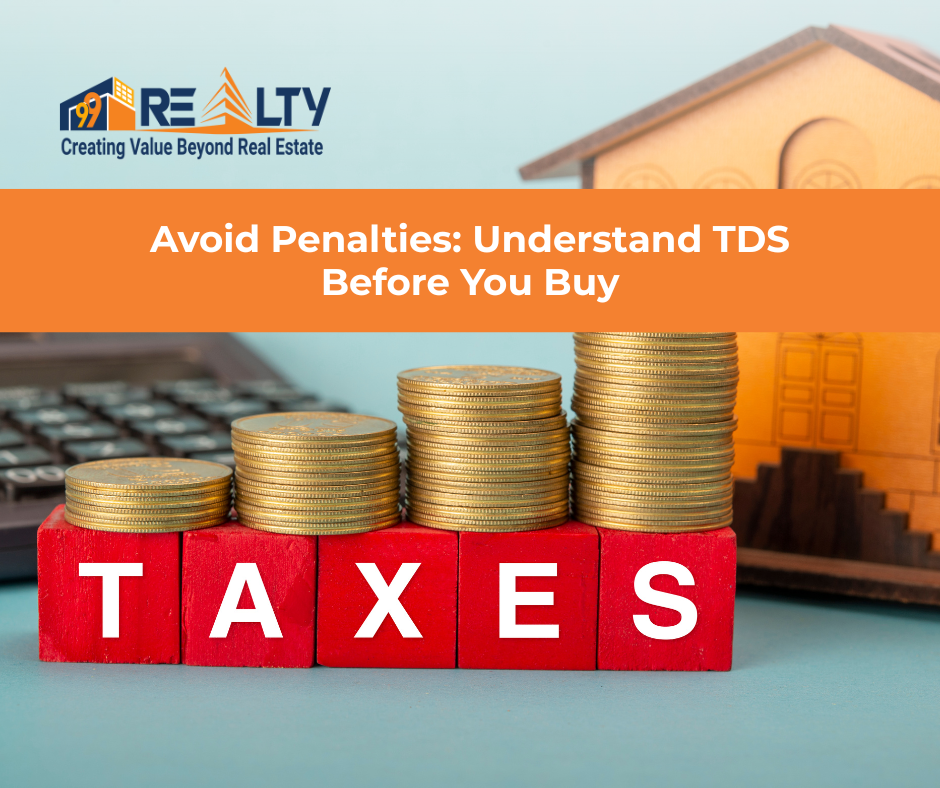Buying a house or plot is exciting — but with the keys comes paperwork and taxes. One of the most overlooked obligations is Tax Deducted at Source (TDS) on property purchase. If you don’t deduct or deposit it properly, you may face interest, penalties, or even prosecution. This guide breaks the topic into plain English so you can buy with confidence.
Understanding TDS on Property Purchase
What Is TDS?
TDS is like skimming a teaspoon of sugar from a bag before passing it on. The payer deducts a small slice of the total and remits it to the government. In real estate, you — the buyer — act as the deductor; the seller receives the balance.
Why the Government Requires It in Real Estate
Property deals are large transactions and a hotspot for tax evasion. TDS ensures the seller’s income is reported, and taxes get collected upfront instead of waiting for an annual return.
How to Apply for Holding Tax in Ranchi: A Complete Guide
Applicability of TDS
When TDS Is Mandatory
- Sale consideration of ₹50 lakhs or more.
- Applies to all types of immovable property — flats, villas, commercial spaces, and land — except rural agricultural land.
- Buyer must deduct TDS even if payment is in installments or financed through a bank loan.
When TDS Is Not Required
- Property value below ₹50 lakhs.
- Rural agricultural land (as defined under the Income Tax Act).
- Certain government-notified transactions.
Current TDS Rates and Thresholds
Section 194-IA (Resident Seller)
- Rate: 1% of the total sale consideration.
- Threshold: ₹50 lakhs.
- No need for TAN; PAN suffices for filing Form 26QB.
Section 195 (NRI Seller)
- TDS on capital gains (not just consideration).
- Effective rate may range from 20% to 30% plus surcharge and cess.
- Must obtain a certificate from the Assessing Officer (lower or nil deduction) if applicable.
TDS Calculation Examples
| Scenario | Sale Consideration | Applicable Rate | TDS Amount |
|---|---|---|---|
| Standard Resident Seller | ₹70 lakhs | 1% | ₹70,000 |
| Joint Buyers (50% each) | ₹90 lakhs | 1% | ₹90,000 (₹45,000 per buyer) |
| NRI Seller (20% on gains assumed) | ₹80 lakhs; gain ₹20 lakhs | 20% | ₹4,00,000 |
Standard Purchase Example
You buy a flat for ₹70 lakhs. Deduct ₹70,000 (1%) and pay ₹69.3 lakhs to the seller. Deposit ₹70,000 with the government using Form 26QB.
Joint Buyers and Sellers Example
Two buyers purchase a property for ₹90 lakhs from two sellers. Each buyer deducts TDS on their share (₹45,000 each) and files separate Form 26QB for each seller.
NRI Seller Example
You buy a property from an NRI for ₹80 lakhs. The gain is ₹20 lakhs. Unless you have a lower-deduction certificate, you must deduct about ₹4 lakhs upfront.
Step-by-Step Process to Deduct and Pay TDS
Step 1: Deduct Before Payment
Calculate 1% (or applicable rate) of the sale consideration. Deduct it from each payment you make — advance, installment, or final.
Step 2: File Form 26QB Online
- Go to the TIN-NSDL portal. Click To Know More
- Fill in buyer and seller details, property details, amount paid, and PANs.
- Pay via net banking or generate a challan to pay at a bank.
Step 3: Download and Issue Form 16B
- After 5–10 days, log into the TRACES portal.
- Download Form 16B (TDS certificate).
- Give it to the seller — they need it to claim credit in their tax return.
Timeline Table: Deduction, Payment, Certificate
| Action | Deadline |
|---|---|
| Deduct TDS | At time of payment to seller |
| Deposit TDS (Form 26QB) | Within 30 days from the end of the month of deduction |
| Issue Form 16B to seller | Within 15 days from due date of Form 26QB |
Penalties and Consequences of Non-Compliance
Interest for Delay
- 1% per month for late deduction.
- 1.5% per month for late remittance after deduction.
Penalty and Prosecution
- Penalty equal to TDS amount for failure to file.
- Prosecution possible for willful default.
- Buyer is treated as assessee-in-default if TDS is not deducted or paid.
Special Situations
Under-Construction Properties
TDS still applies if total cost exceeds ₹50 lakhs. Deduct on each installment you pay to the builder.
Home Loans and Installments
Even when the bank disburses the loan directly to the seller, you (the buyer) must ensure TDS is deducted and deposited for each disbursal.
Rural Agricultural Land
No TDS required if the land qualifies as rural agricultural land under Section 2(14) of the Income Tax Act.
Practical Tips to Avoid Mistakes
Verify PAN Details
Enter buyer and seller PANs accurately in Form 26QB. A mismatch can block the seller’s tax credit.
Keep Digital Records
Save all challans, acknowledgments, and certificates electronically and in print for at least seven years.
Use Online Calculators and TRACES
Income-tax-department calculators help compute TDS automatically. TRACES shows the status of your payment.
Conclusion
TDS on purchase of property isn’t an optional extra — it’s your statutory duty. But with the right knowledge, it’s straightforward: calculate, deduct, pay, and issue the certificate. This protects you from penalties and gives the seller a clear record for tax purposes. Whether you’re buying your first home or adding to your portfolio, following these steps ensures a smooth, compliant transaction.
FAQs
1. Is TDS applicable on property booked under construction?
Yes, if the total consideration exceeds ₹50 lakhs, deduct TDS on each installment.
2. Do I need a TAN to deduct TDS on property purchase?
No. Under Section 194-IA, buyers don’t need a TAN; PAN is sufficient.
3. How can an NRI seller reduce high TDS?
By obtaining a lower-deduction certificate from the Assessing Officer under Section 197.
4. What happens if I paid the seller without deducting TDS?
You may be treated as assessee-in-default and liable for tax, interest, and penalty. Pay immediately and file Form 26QB to mitigate damage.
5. Can I pay TDS offline?
You must generate Form 26QB online, but you can then pay at an authorized bank branch if you don’t use net banking.
Disclaimer: The information provided in this article is for general educational and informational purposes only. It does not constitute legal, tax, or financial advice. Tax laws and regulations may change and can vary depending on individual circumstances. Readers are advised to consult with a qualified tax professional or legal advisor before making any decisions or taking action based on the content of this blog.
Need Help?
Need help evaluating a property or planning your next move in the market?
Reach out to 99 REALTY – your trusted real estate partner for smarter choices.
Subscribe to get updates on our latest posts and market trends.






Join The Discussion